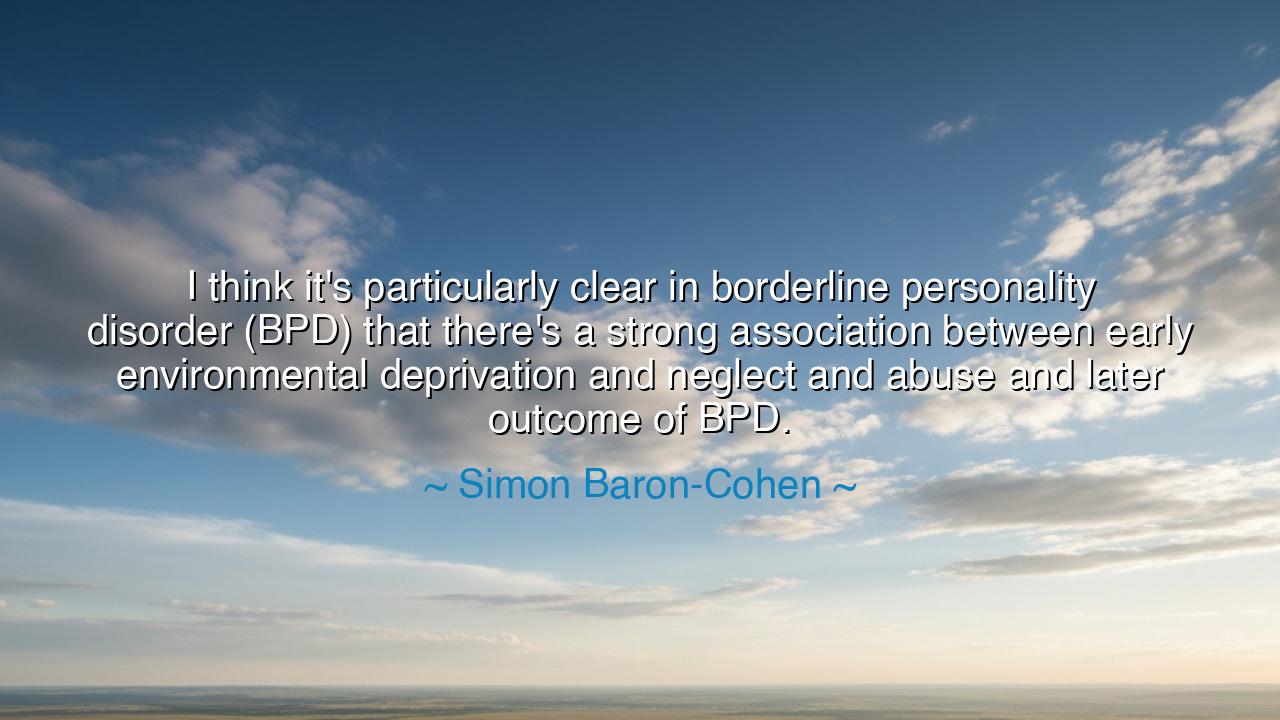
I think it's particularly clear in borderline personality
I think it's particularly clear in borderline personality disorder (BPD) that there's a strong association between early environmental deprivation and neglect and abuse and later outcome of BPD.






Hear, O seekers of wisdom, the words of Simon Baron-Cohen: “I think it's particularly clear in borderline personality disorder (BPD) that there's a strong association between early environmental deprivation and neglect and abuse and later outcome of BPD.” These words carry both sorrow and revelation, for they expose the deep bond between the wounds of childhood and the struggles of adulthood. In them, we are reminded that the soul, especially in its tender years, is shaped not only by nature but by nurture, not only by birth but by love—or its absence.
The ancients long understood that the earliest years are sacred. Just as a young tree bends easily and grows according to the hand that guides it, so too does the heart of a child grow according to the care—or cruelty—it receives. Environmental deprivation, the absence of warmth and stability, is like planting a seed in barren soil. Neglect, the failure to nurture, is like withholding water from a sapling. Abuse, the violation of trust, is like striking the tree until it bears scars in its bark. And so, when adulthood comes, the fruit it bears may be twisted by the suffering of its roots.
Consider the tale of Victor of Aveyron, the “wild child” of France, who was found in the forests in the late eighteenth century. Having grown up without human care, he lacked speech, connection, and trust. Though physicians and teachers tried to reach him, much had already been lost. His story reveals in stark light what Baron-Cohen affirms: that early deprivation leaves lasting marks upon the mind and heart, which no late effort can fully erase.
Yet let us not despair. For though the wounds of early life may incline one toward suffering, healing is not beyond reach. Just as a tree, though bent, may still grow toward the sun, so too can those who have endured neglect and abuse rise toward wholeness with care, therapy, and love. The lesson of psychology and history alike is that while pain leaves scars, compassion and patience may soften them. What was once broken can still be mended—not erased, but transformed into strength and resilience.
The origin of Baron-Cohen’s teaching lies in the union of science and compassion. As a scholar of the mind, he has seen patterns repeated: children who grow up without safety and tenderness are far more likely to bear the storm of borderline personality disorder later in life. Yet his words are not condemnation, but a call to action—for if we know the root of suffering, we may also know the path of prevention. By guarding children from deprivation, neglect, and abuse, we guard the very future of their hearts.
The lesson, therefore, is clear: the care of children is not merely a family’s duty, but the duty of all humanity. A society that permits children to grow in violence, hunger, or loneliness will reap not prosperity but sorrow. A community that shelters, educates, and loves its young plants seeds of stability, compassion, and strength that will endure for generations. The health of the child is the health of the nation.
Practical action lies before us: protect the vulnerable, strengthen families, provide homes where safety is assured and love is abundant. Support teachers, counselors, and healers who tend the wounds of those already afflicted. And in your own life, be a presence of care to the children within your reach, for even a single word of kindness may become a lantern in the darkness.
So let it be remembered: BPD, like many struggles of the mind, is not born from weakness, but from wounds. Neglect and abuse are not only personal tragedies, but seeds of suffering that grow across a lifetime. Therefore, honor the children, guard their hearts, and water their roots with love—so that they may grow strong, and so that the sorrows of today may not be carried into the lives of tomorrow.






AAdministratorAdministrator
Welcome, honored guests. Please leave a comment, we will respond soon